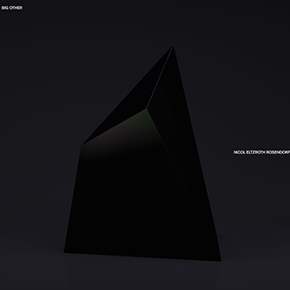 As Scratched Glass, Nicol Eltzroth Rosendorf (alongside Jon Lukens) has released two stripped down tapes riddled with obscure sounds and intricate, nuanced production. Minimal, yet rich; dark, yet inviting, they were a study in contrasts and contradictions. For Big Other, he not only has opted for the vinyl format, but also working under his own name. Indicative of change, the record is certainly a different sounding one based on his previous work. With the integration of rhythms and the vocal contributions of Jarboe, but still featuring just the right amount of abstraction, the final product feels like the natural evolution of a composer/producer who had already set a high water mark before, but continues to push ahead.
As Scratched Glass, Nicol Eltzroth Rosendorf (alongside Jon Lukens) has released two stripped down tapes riddled with obscure sounds and intricate, nuanced production. Minimal, yet rich; dark, yet inviting, they were a study in contrasts and contradictions. For Big Other, he not only has opted for the vinyl format, but also working under his own name. Indicative of change, the record is certainly a different sounding one based on his previous work. With the integration of rhythms and the vocal contributions of Jarboe, but still featuring just the right amount of abstraction, the final product feels like the natural evolution of a composer/producer who had already set a high water mark before, but continues to push ahead.
The abstraction and use of unidentifiable sounds that was so prevalent with Scratched Glass are still apparent throughout Big Other, but for most of the six pieces presented here it is used sparingly to flesh out the more commanding sounds of drums, voice, and guitar.The low contrabass rumble that opens "Thrown Into Being" would not have been out of place on one of those earlier cassettes, but the live percussion and distorted guitar that are later added make for a very different sound.The pummeling drums and buzzing guitars result in a brilliant sense of tension that builds and builds before relenting to elegant, electronic spaces.
The album's centerpiece, "New Heart," is cut from a similar cloth, but with Rosendorf going off in an entirely different sonic direction.Twinkling passages of electronics lead off as Jarboe's vocal is delicately weaved in.Her wordless performance recurs throughout, befitting the simultaneously dark and inviting mix of various instruments and treatments.As before, Rosendorf brings in commanding drum rhythms, processed to give an undeniable level of intensity and demonstrates his simultaneous skills in sound design as well as composition.With a massive sense of depth and swirling electronics and voices, it is as ominous as it is beautiful.
On the other side of the record, Rosendorf eschews the prominent rhythms for greater variations of tone and texture that may be somewhat different overall, but complement the first two pieces perfectly."Several Days Later I Got Up the Nerve to Look at Myself in the Mirror for the First Time" begins calmly enough.Droning electric piano is complemented with jagged, metallic FM bells and chimes giving a bleak melodic accompaniment to the textural hum.On the surface it is all pleasant, but there are hints of a repressed, malicious force that is just there waiting to be unleashed. Around the midway point, that darkness breaks through in the form of harsh guitar and electronic processing that pounds through the initially lighter mix.Again he works with contrasts, alternating between the softer and harsher sounds throughout.
The album ends on a three-song suite that again demonstrates Rosendorf’s penchant for working with contrasts and juxtapositions.The first segment, "Shegiah," is a surprising mix of slightly jazzy piano and contrabass.He is working with conventional sounds, but with the skeletal production and sparse arrangement, there is a distinctly morose quality to the piece.In the transition to "Golden Repair" he drops the sparseness for a surge of distorted cello and electronics instead.Brought in tastefully, the dissonant sounds envelope much of the sound that preceded it.By the concluding "A Shield of Ceilings in the Drift" Rosendorf brings everything full circle with the distortion retreating and the piano returning, fleshed out with additional instrumentation and production to close on a calm, somber note.
One of the strengths of Big Other is Rosendorf’s deftness in blending together a myriad of sounds and moods, often into a single piece, perfectly and effortlessly.The smoothness in the transition from the pounding, suspense score rhythms of "Thrown Into Being" into a delicate electronic conclusion is performed expertly, and the simultaneously sacred and profane sounds of "New Heart" are so expansive and diverse all within a single piece.With Scratched Glass, Rosendorf proved himself an expert at creating idiosyncratic sounds and complex, multifaceted production, but with Big Other he has pushed that into a beautiful, multidimensional colossus of a record that is as complex as it is unique.